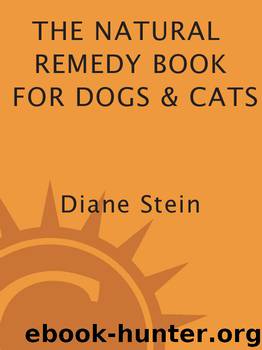Natural Remedy Book for Dogs and Cats by Diane Stein

Author:Diane Stein [Stein, Diane]
Language: eng
Format: epub
ISBN: 978-0-307-82789-0
Publisher: Potter/TenSpeed/Harmony
Published: 2012-10-03T04:00:00+00:00
Coughing
Coughing can be a symptom of an infection (viral, bacterial, fungal, or parasitic), an inhalant allergy, asthma, heart dis-ease, a foreign object in the lung, or pressure on the larynx from tight collars or growths. Worm larvae in the respiratory system can cause coughing. “Kennel cough” is an infectious dis-ease of dogs characterized by a harsh, dry cough that sounds more frightening than it usually is; this type of cough in cats may indicate bronchitis. A cough with fever, sneezing and runny eyes indicates a viral respiratory condition. A high, weak, gagging cough with swallowing and lip-licking in dogs or cats usually means a sore throat or tonsillitis. A moist, bubbly cough indicates fluid or phlegm in the bronchial tubes—from infection, asthma, bronchitis or allergy. Prolonged spasmodic coughing after exercise indicates heart dis-ease. Wheezing coughs accompany asthma or allergic bronchitis.
Given so many possibilities, a coughing cat or dog needs veterinary diagnosis and care. If the cough is due to heart dis-ease, see the section in this book on that ailment. For asthmatic coughs and viral dis-eases, see those sections in this book when local irritation is the sole source of the cough, or when veterinary information suggests that symptomatic relief is indicated, the remedies listed below may be used. Kennel cough responds to these remedies also—but again, work with your holistic veterinarian. A cough is caused by irritation to the air passages, and continued coughing increases the irritation. The irritation dries the mucous membranes lining the lungs and throat, and this causes more irritation and more coughing.
The following remedies help to break the coughing cycle; they may be used with other holistic or veterinary/medical methods to offer relief.
Naturopathy: If the animal has any form of infectious dis-ease or fever, she must be fasted on liquids with enemas for detoxification. A pet with this type of dis-ease will usually refuse food, and this is positive. During the fast give honey or other bee products. Garlic is an important antiseptic here. Anitra Frazier uses Delicious Garlic Condiment, mixing 1/4 teaspoon raw crushed garlic with 1/8 teaspoon each of distilled water and tamari soy sauce. Let stand two to five minutes, then mix with the pet’s dinner or liquids;33 use higher amounts for animals larger than a cat. The D.C. Jarvis cough remedy is a good one for pets: boil a lemon for ten minutes, juice it, put the juice in a glass with an ounce of vegetable glycerine, stir well and fill the rest of the glass with raw honey. Apple cider vinegar may be substituted for the lemon juice. Use as needed in teaspoon doses, stirring the mixture before administering it.34 Compresses to the throat and chest of cider vinegar, castor oil or oil of eucalyptus (one teaspoon per cup of warm olive oil) may be used.
Vitamins and Minerals: Very high amounts of vitamin C are essential for any respiratory dis-ease. Go to bowel tolerance, mixing sodium ascorbate C with whatever liquids you are giving. C is also used intravenously, in the amount of 200-500 mg per pound of body weight twice a day.
Download
This site does not store any files on its server. We only index and link to content provided by other sites. Please contact the content providers to delete copyright contents if any and email us, we'll remove relevant links or contents immediately.
Finding Gobi by Dion Leonard(2836)
Grumpy Cat by Grumpy Cat(2743)
A New Earth: Awakening to Your Life's Purpose by Eckhart Tolle(2644)
The Silkworm by Robert Galbraith(2487)
Tippi by Tippi Hedren(2228)
End of Days by Sylvia Browne(2176)
Total Cat Mojo by Jackson Galaxy(2003)
Backyard Chickens Beyond the Basics by Pam Freeman(1938)
Penguin Bloom by Cameron Bloom(1930)
The Animals Among Us by John Bradshaw(1861)
The Ultimate Pet Health Guide by Gary Richter(1760)
All Things Bright and Beautiful by James Herriot(1751)
The Plant-Based Dog Food Revolution by Mimi Kirk(1709)
Vet in Harness by James Herriot(1697)
Doggy Desserts: 125 Homemade Treats for Happy, Healthy Dogs by Cheryl Gianfrancesco(1678)
Dog Years by Mark Doty(1676)
Cesar's Way by Cesar Millan(1668)
Chicken Soup for the Ocean Lover's Soul by Jack Canfield(1642)
Animal Speak by Ted Andrews(1618)
